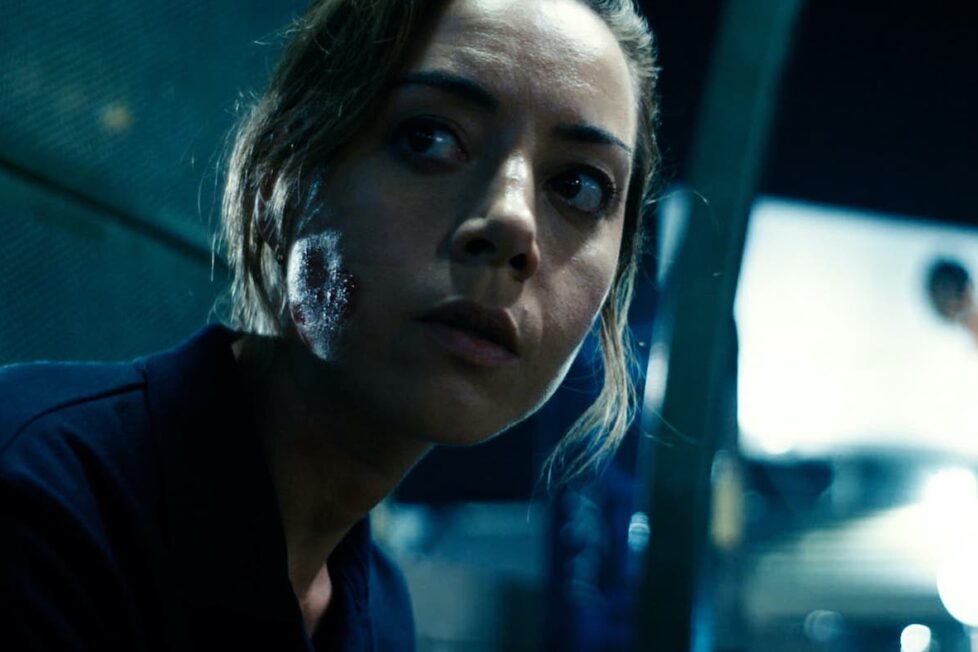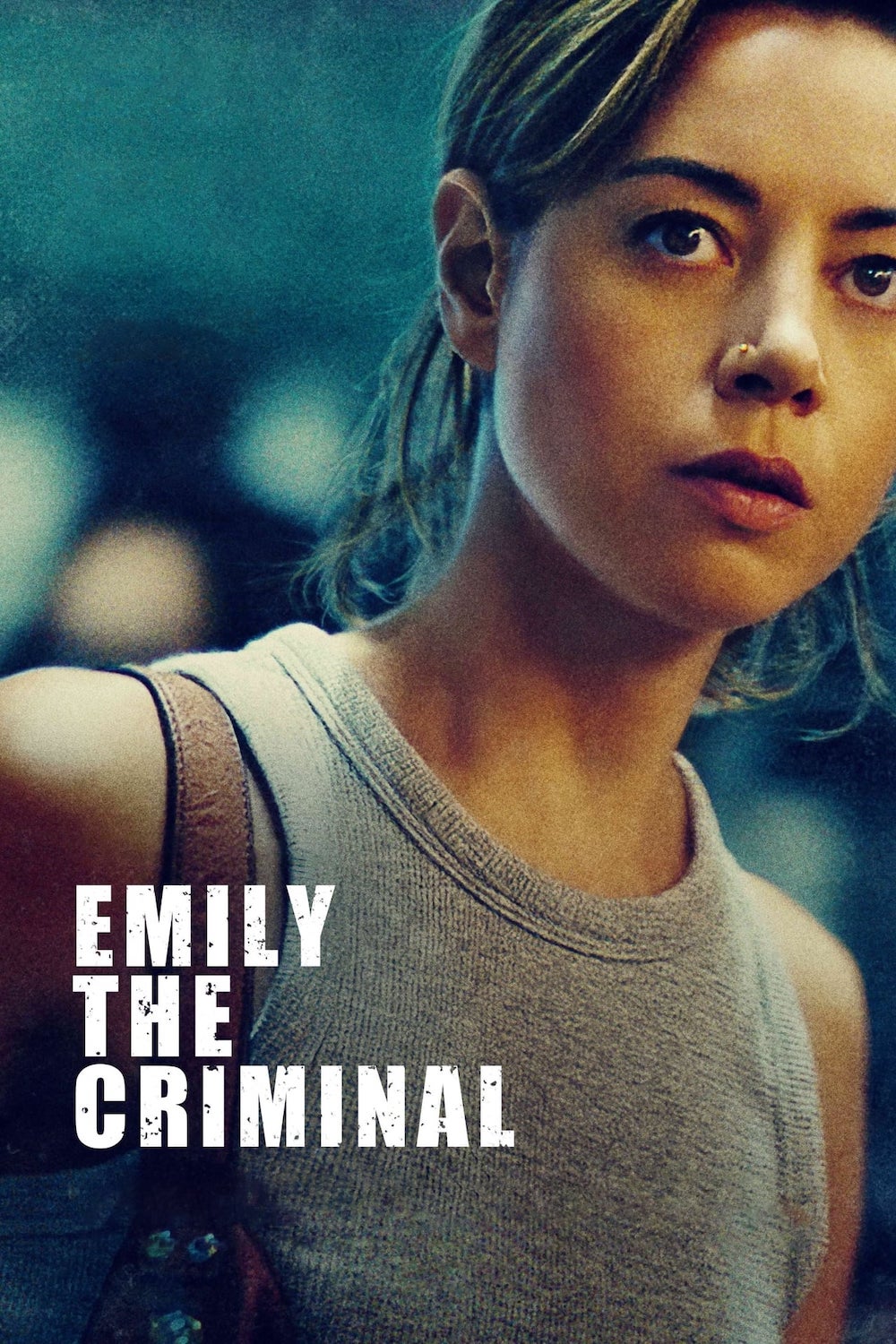EMILY THE CRIMINAL (2022)
A debt-ridden woman gets involved in a credit card scam that pulls her further into the criminal underworld.

A debt-ridden woman gets involved in a credit card scam that pulls her further into the criminal underworld.


“Motherfuckers will keep taking from you and taking from you until you make the goddamn rules yourself” is a line that reverberates throughout Emily the Criminal. Written and directed by John Patton Ford, his auspicious feature-length debut is an unflinching crime-thriller with an expertly crafted screenplay. Deeply rooted in his own personal experience, its authenticity derives from the filmmaker’s nuanced depiction of America’s punitive economic system. While it’s not the most original story, Emily the Criminal is an engrossing portrayal of an individual searching for meaning and finding it in an illicit situation.
Set amidst the seedy underbelly of Los Angeles, Emily (Aubrey Plaza) is in a desperate situation: as her monstrous student debt accrues interest, she’s breaking her back at a food delivery company. Her attempts at getting an office job are soured when a criminal conviction from her past is constantly brought up during interviews. Unable to secure more lucrative employment, Emily becomes lost as her friend Liz’s (Megalyn Echikunwoke) career blossoms in stark contrast.
Then, while covering a shift for her co-worker Javier (Bernardo Badillo), he provides a phone number for another potential job and the would-be employer asks to meet her at a warehouse with other people desperate for money. There they all find Youcef (Theo Rossi), a Lebanese immigrant who runs a fraudulent credit card operation, and their new job involves purchasing expensive merchandise with fake information and selling them on the black market. Emily hesitates initially but can’t resist the opportunity to make $200 an hour, and the rush of adrenaline ignites something inside her enough that she begins working her own schemes with Youcef. However, Emily’s recklessness eventually puts her life in jeopardy…

Since launching her career with TV’s Parks and Recreation, Aubrey Plaza has proven she’s almost unmatched in her ability to deliver sardonic remarks. However, since expanding her repertoire with Ingrid Goes West (2017) and Black Bear (2020), the actress has proven she’s more than capable of leaving her irreverent persona behind. While also serving as a producer, Emily the Criminal is anchored by Plaza’s controlled performance as the titular character, as she balances a desperate vulnerability while maintaining her unpredictability as Emily navigators her newfound criminal lifestyle. Appearing onscreen during an interview, there’s a palpable sense of defeat behind her expressive eyes as she endures various humiliations. A conviction for assault derailed her art school education and most of her employment prospects. However, as Emily becomes entangled in the extralegal underworld, the actress imbues her character with fierce determination and an impulsive physicality. She acts without overthinking and isn’t afraid of violence. Plaza’s performance is captivating as she transitions from sympathetic to fearless beautifully, perfectly demonstrating her versatility as an actress.
On the surface, John Patton Ford’s movie debut isn’t that much different from numerous other crime-thrillers. It’s set amongst the dilapidated urban landscape of downtown L.A. and adheres to most of the tropes one expects. However, what makes Emily the Criminal feel unique amongst similar thrillers is its commitment to making us empathise with a lawbreaker. Within its gritty aesthetic is such a compelling and honest portrayal of survival. Handled with the same confidence as Michael Mann (Heat) with the humanity of Billy Wilder (Double Indemnity), Ford allows audiences to understand why inequality would push someone to pursue their dreams via such questionable means. When asked why she didn’t finish school, Emily responds “legal fees and student loans. I had to take care of my grandmother, I had to work.” When financial desperation and a chance to make easy money intersect, it’s understandable how she finds herself drawn into the criminal underworld. Moralistic viewers may take issue with the conclusion and perhaps yearn for something completed with a comeuppance. Rather than scrutinising the morality of thievery, Ford transforms his story into something much more layered.

It’s easy to forget Emily the Criminal was produced with a $3M budget because Ford masterfully crafts an unyielding amount of suspense with such few resources. Complimented by Jeff Bierman’s (Friday’s Child) disorienting cinematography, the hand-held sequences become increasingly frenetic as Emily becomes entrenched in illegal activities. Predominantly presented from the eponymous character’s perspective, Ford deftly immerses us in Emily’s mindset. The intimate compositions focussed on Plaza’s face during adrenaline-fuelled moments heighten the increasingly dangerous situations with escalating stakes. Simple exchanges including purchasing expensive electronics with fake credit cards instantly become terrifying for the diminutive young woman. One sequence involving two mafiosos is incredibly unnerving! With only a small window of time, Emily has to purchase a car before they discover the bank has denied her false cashier’s check. Similarly, Harrison Atkins’ (Lace Crater) ingenious editing techniques elevate the proceedings and maintain the suspense throughout the taut 95-minute runtime. Similar to Safdie Brothers’ Uncut Gems (2019), many transitions are met with disarmingly loud sounds caused by ordinary actions. In the hands of a lesser filmmaker, it could easily become obnoxious and overbearing. However, the sense of irritation and discomfort felt by the protagonist becomes palpable.
Although ostensibly a suspenseful crime thriller, Emily the Criminal also serves as an interesting allegory of capitalism. Partly inspired by his own student debt and unemployment terrors, Ford reserves his harshest indictment for the society that made Emily a criminal. While living in shared accommodation, she’s trapped in a cycle of poverty. As an independent contractor at the restaurant, she receives no benefits or protection from management. Whereas her student loans are quickly accruing interest and she’s constantly plagued by her previous misdemeanour. It’s her disgust and refusal of an unpaid internship that underlines the exploitative nature of the capitalist marketplace. One of the most explosive scenes occurs when Emily attends a job interview for a prestigious marketing company. After discovering the position is an unpaid internship, she retaliates by scorning the idea of exploitation. Alice (Gina Gershon) lambasts Emily for her sense of entitlement and unwillingness to work without pay for several months. It’s a striking sequence that perfectly captures the unfairness of wealth inequality, suggesting Emily’s illicit lifestyle is no less exploitative than what millions of workers endure every day.
Without manipulating manufactured drama, Emily the Criminal remains an enthralling experience due to John Patton Ford’s taut direction and concise screenplay. It’s an intense crime thriller and a fascinating character study that’s anchored by a riveting lead. Plaza delivers a remarkable performance whose intensity makes her someone not to be crossed. Similar to her character, she fully commits to the role with ferocity and strength. Emily the Criminal may not end the stranglehold large corporations have on the working class, but it’s an empowering tale for everyone that can relate to Emily’s struggles.
USA | 2022 | 93 MINUTES | 2:35:1 | COLOUR | ENGLISH


writer & director: John Patton Ford.
starring: Aubrey Plaza, Theo Rossi, Jonathan Avigdori, Megalyn Echikunwoke & Gina Gershon.
